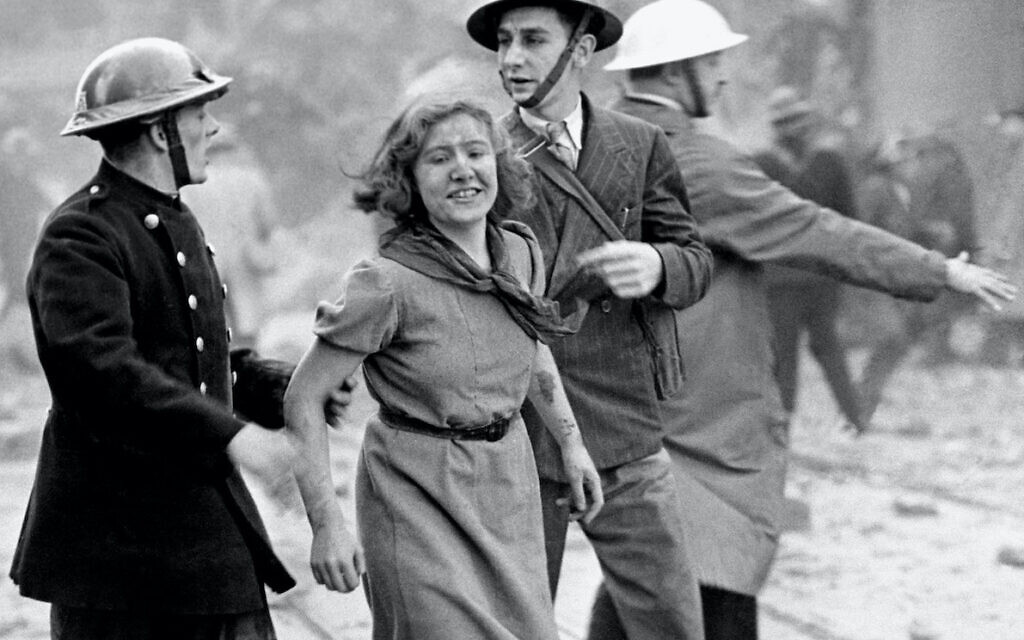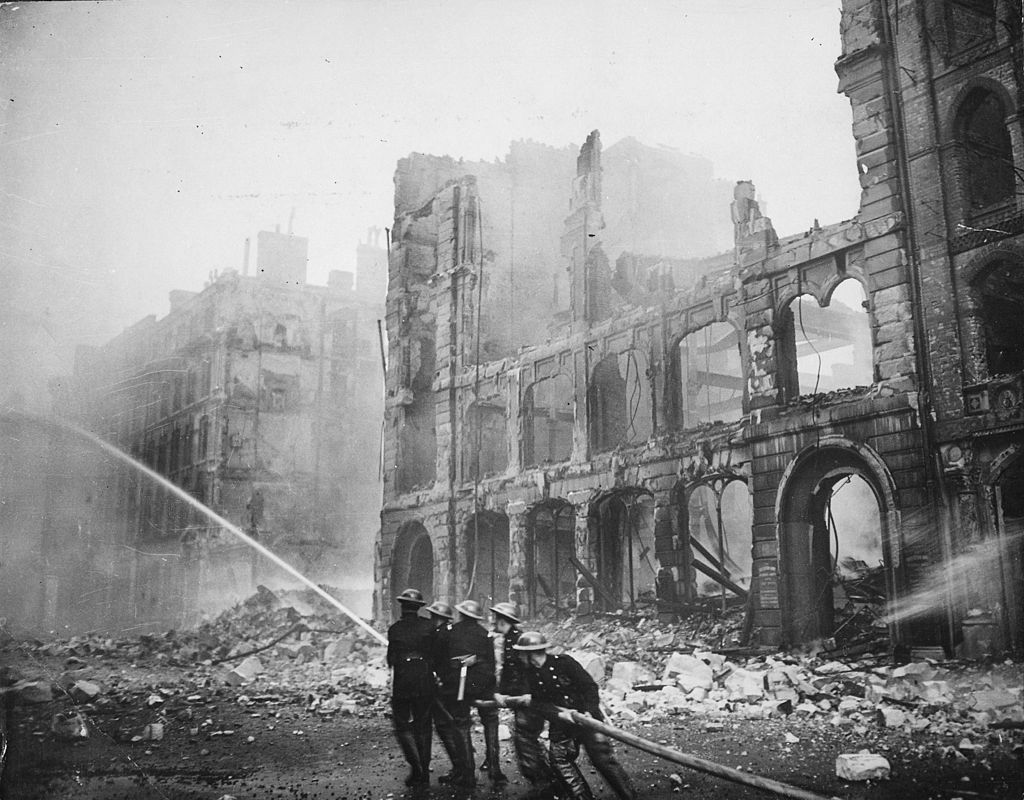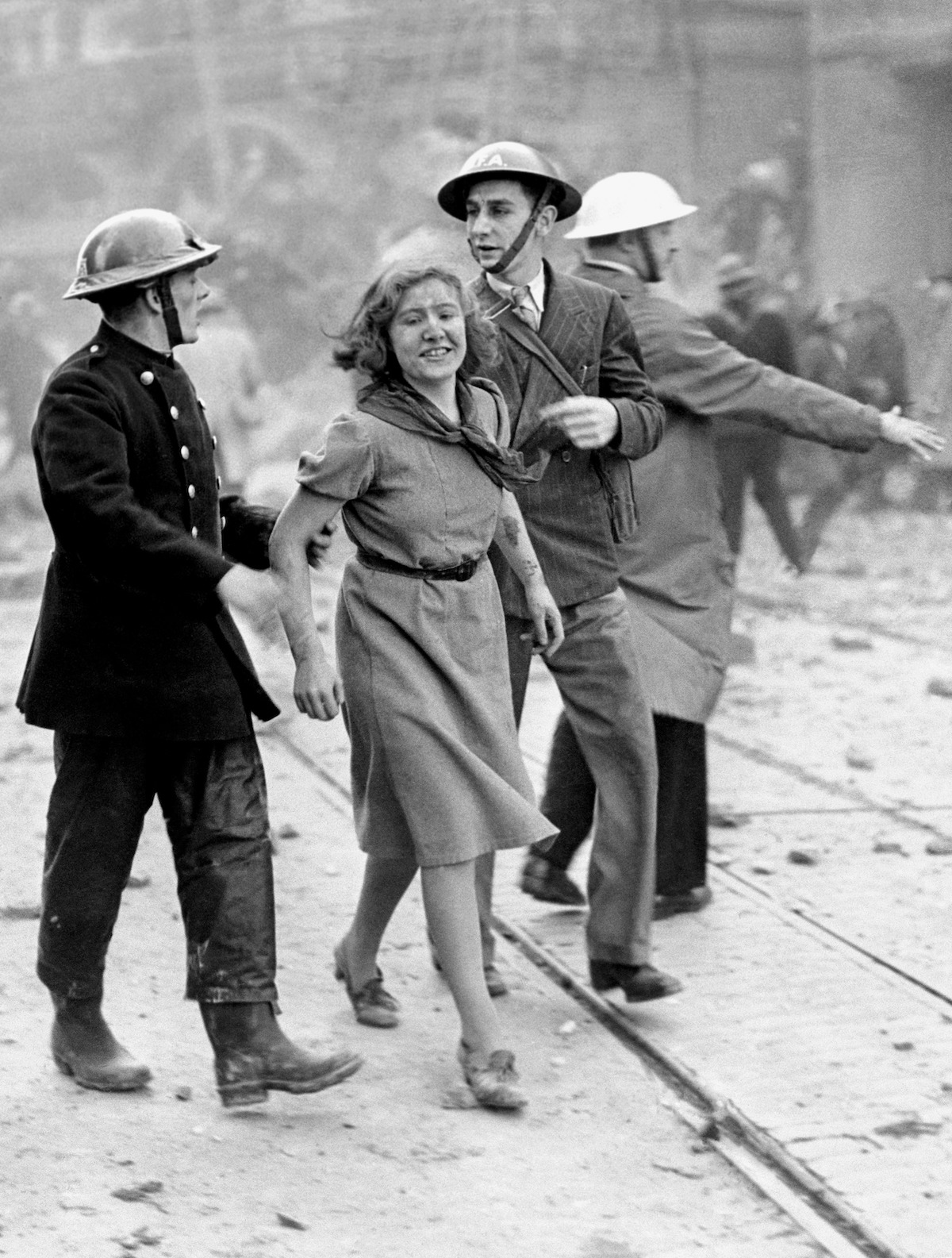Memories of The Blitz 80 years on: ‘Only the staircase of our house was left’
Eight decades after British cities were bombed during the Second World War, Jenni Frazer speaks to those with first-hand memories of the terrifying experience

This week, 80 years ago, the German Luftwaffe began a systematic bombing of London, which lasted for a terrifying eight months and five days. More than a million homes were destroyed or damaged in what became known as the London Blitz — and thousands of civilians were killed or injured.
Those who have first-hand memories of the Blitz today are in their late 80s or early 90s, and were children during the Blitz — which was carried out in other major British cities, too. Many of the children were evacuated from the capital — though some did return to London, both during the Blitz, and after it ended in May 1941.
Among those who were sent out of London by their parents were Ron Shelley and his little sister, Anne. Today Ron, a national vice-president of Ajex, is an MBE for his services to the Jewish community.
Get The Jewish News Daily Edition by email and never miss our top stories Free Sign Up
Back in 1940, however, Ron was 10 and Anne was six years old when their parents sent them out of London to keep them safe. They went, at the outbreak of the war in 1939, to Virginia Water, Surrey, only about 20 miles from London, from their home in Stepney Green.
“We assembled in a village hall while people walked round to choose which children they would take home. But nobody picked us, so the billeting officer found Mr and Mrs Hammond, and we were both taken to their home”, said Ron.
The children’s parents visited whenever they could. Ron’s father, a ladies’ hairdresser, became an ambulance driver during the Blitz, a scary and risky part of civil defence. Later, despite being 38, he was called up and sent to a unit in India, while the children’s mother continued war work in England. The Shelley children remained out of London for most of the war, more than five years for Ron and around four for his sister.
The Shelley family were lucky: their London tenement flat was not caught in the bombing, though plenty of their Stepney neighbours were not as fortunate.

And though Ron was in Virginia Water, the fires and results of the Blitz bombing could be seen from where he was. “We knew what was going on — one night in December, 1940, we could see the flames in London”.
Tragically, the bombing was not confined to London. One day at school in Surrey, the headmaster announced that Dan Plant, a pupil who sat at the next desk to Ron Shelley, had been killed, the night before.
Ron explained: “There was a German bomber which was being attacked by a British Mosquito fighter plane, and instead of proceeding to London the German pilot dropped his bombs where he was — over Weybridge, and Dan and his whole family died as a result.”
We assembled in a village hall while people walked round to choose which children they would take home. But nobody picked us, so the billeting officer found Mr and Mrs Hammond, and we were both taken to their home
Ruth Glassman is today a Jewish Care Meals on Wheels volunteer, though her work has been disrupted by the coronavirus pandemic.
She said: “My war memories are very blurred —I was a very little girl.
“We lived in a house in Filey Road (Hackney). We lived with my grandfather, my mother’s widowed father. We had the ground floor and the basement level. The first floor was rented to a Mrs Atkins, and the top floor was occupied by my father’s sister, Annie, her husband, Uncle Julie, and their son Roy.

“We had an Anderson shelter in the garden and a reinforced table, a Morrison shelter, in the basement, thought to be the safest part of the house. It was bought because I was too frightened to go into the Anderson shelter; I remember, [during the Blitz], my father used to cuddle me under the table, while my mother went into the Anderson shelter with the rest of the occupants of the house.
Ruth’s father and her uncle Julie became night-time fire-watchers throughout the Blitz, reporting where bombs had landed so that the fire-fighters could attend directly. During the day, her father worked in a factory owned by another uncle, which made sandbags, vital to civil defence work.
There was a German bomber which was being attacked by a British Mosquito fighter plane, and instead of proceeding to London the German pilot dropped his bombs where he was — over Weybridge, and Dan and his whole family died as a result
One evening, at which point Ruth had been evacuated to her aunt and uncle’s house in Brighton, they told her that her parents’ house had been bombed. “They said that my parents and baby sister, who I hardly knew, were on their way to Brighton. I was delighted that my parents were coming and I was allowed to stay up late to see them. My mother was alone in Filey Road when a bomb hit the house. It was lucky she went under the stairs with my baby sister, as the only part of the house left standing was the staircase”.
Jeffrey Glassman, Ruth’s husband, also has very early childhood memories of the Blitz. He was born in December 1936, so was not quite three when war broke out in September 1939.
He said: “I remember standing in the playground of my primary school, Craven Park School, wearing an overcoat, with a name and address label attached, and with a gas mask on a string, over my shoulder. I must have been about four years old, and we were living at 32 Moundfield Road, Stamford Hill, where most of the Glassman family lived.
“Because of the Blitz, we had to be evacuated. We travelled around quite a bit. [My sister] Linda was born in November 1940 in Worcester, where we lived with a lady named Mrs Potter. The house had a large garden, and I can remember Mrs Potter showed me how to skin a rabbit. We also moved to Stevenage, and Warrington, where I remember there was a coal mine.
“We had an Anderson shelter in the garden of Moundfield Road and I remember sitting in it with Mum and Linda. Mum used to make sandwiches for us to eat in the shelter, as we often spent hours there. We must have moved back to London at some time. I remember us sitting under the staircase at home during an air raid, and also sleeping in underground tube stations with many other families on the platform.
“A V-1 rocket, called a Buzz Bomb or Doodlebug, fell on Moundfield Road and caused extensive damage. You could hear the buzzing noise as it flew overhead, and you knew you were safe as long as you could hear that. The time to worry was when it stopped buzzing, as that was when it fell to the ground. Fortunately, we were away from London at the time. Many houses were completely flattened by the rocket, and our house had all the windows blown out, the roof blown off, and the bath from the upstairs bathroom was found in the kitchen.
“I was told that a lady in the house next door had died in the blast from the rocket. Two young cousins, Anita and Betty, were killed in the Blitz, while they were at the doorway to an air raid shelter. Their house was in the next street to ours, Castlewood Road.
A V-1 rocket, called a Buzz Bomb or Doodlebug, fell on Moundfield Road and caused extensive damage. You could hear the buzzing noise as it flew overhead, and you knew you were safe as long as you could hear that.
Jeffrey Glassman added: “The war was a terrible time to live through, particularly difficult for the women, who had no support from husbands serving abroad. They had to make the best of things with very little food or money, raising children, being evacuated and moving around the country to wherever they could stay. The Blitz meant bombing raids every night, nights spent in cold dark air raid shelters, houses destroyed, loved ones killed”.

Thank you for helping to make Jewish News the leading source of news and opinion for the UK Jewish community. Today we're asking for your invaluable help to continue putting our community first in everything we do.
For as little as £5 a month you can help sustain the vital work we do in celebrating and standing up for Jewish life in Britain.
Jewish News holds our community together and keeps us connected. Like a synagogue, it’s where people turn to feel part of something bigger. It also proudly shows the rest of Britain the vibrancy and rich culture of modern Jewish life.
You can make a quick and easy one-off or monthly contribution of £5, £10, £20 or any other sum you’re comfortable with.
100% of your donation will help us continue celebrating our community, in all its dynamic diversity...
Engaging
Being a community platform means so much more than producing a newspaper and website. One of our proudest roles is media partnering with our invaluable charities to amplify the outstanding work they do to help us all.
Celebrating
There’s no shortage of oys in the world but Jewish News takes every opportunity to celebrate the joys too, through projects like Night of Heroes, 40 Under 40 and other compelling countdowns that make the community kvell with pride.
Pioneering
In the first collaboration between media outlets from different faiths, Jewish News worked with British Muslim TV and Church Times to produce a list of young activists leading the way on interfaith understanding.
Campaigning
Royal Mail issued a stamp honouring Holocaust hero Sir Nicholas Winton after a Jewish News campaign attracted more than 100,000 backers. Jewish Newsalso produces special editions of the paper highlighting pressing issues including mental health and Holocaust remembrance.
Easy access
In an age when news is readily accessible, Jewish News provides high-quality content free online and offline, removing any financial barriers to connecting people.
Voice of our community to wider society
The Jewish News team regularly appears on TV, radio and on the pages of the national press to comment on stories about the Jewish community. Easy access to the paper on the streets of London also means Jewish News provides an invaluable window into the community for the country at large.
We hope you agree all this is worth preserving.
-
By Brigit Grant
-
By Laurent Vaughan - Senior Associate (Bishop & Sewell Solicitors)
-
By Laurent Vaughan - Senior Associate (Bishop & Sewell Solicitors)
-
By Laurent Vaughan - Senior Associate (Bishop & Sewell Solicitors)
-
By Laurent Vaughan - Senior Associate (Bishop & Sewell Solicitors)





















